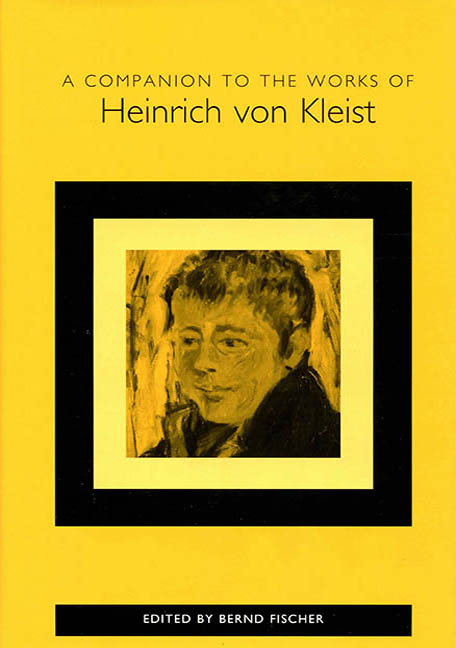Book contents
- Frontmatter
- Contents
- Introduction: Heinrich von Kleist's Life and Work
- Critical Approaches
- Language and Form
- On Structures in Kleist
- Strange News: Kleist's Novellas
- The Eye of the Beholder: Kleist's Visual Poetics of Knowledge
- The Performative Turn of the Beautiful: “Free Play” of Language and the “Unspeakable Person”
- Intellectual Paradigms
- Themes and Motifs
- Notes on the Contributors
- Index
The Performative Turn of the Beautiful: “Free Play” of Language and the “Unspeakable Person”
from Language and Form
Published online by Cambridge University Press: 27 April 2017
- Frontmatter
- Contents
- Introduction: Heinrich von Kleist's Life and Work
- Critical Approaches
- Language and Form
- On Structures in Kleist
- Strange News: Kleist's Novellas
- The Eye of the Beholder: Kleist's Visual Poetics of Knowledge
- The Performative Turn of the Beautiful: “Free Play” of Language and the “Unspeakable Person”
- Intellectual Paradigms
- Themes and Motifs
- Notes on the Contributors
- Index
Summary
Kleist’s experience and conception of language and speech, as well as those of his characters, are ambiguous. They vacillate between a secure faith that language can achieve everything through speech and a deep skepticism of language — a belief that what is to be communicated fails in principle through language. The stagnation of language (Neumann 1994) that befalls Kleist's figures over and over is an expression of this ambivalence. This situation is hardly surprising for an artist whose medium is language. But the areas in which Kleist, nevertheless, postulates positively or ex negativo a successful type of speech are quite notable. Determining these moments in their linguistic environment promises insights into Kleist's reflections on language and will help us recognize the models on which they are based.
Kleist drafted his oft-discussed paradigm of successful speech in the essay “Über die allmählige Verfertigung der Gedanken beim Reden.” Speech in situations such as an oral examination or the delivery of ideas conceived beforehand in a non-communicative manner are offered as examples of unsuccessful speech. At the same time, the success of the essay itself as a speech act proves to be doubly limited. At the end of the essay Kleist promises a further installment that, however, never appeared and thus categorizes his essay as unfinished. Furthermore, the essay, with its dedication to a friend, Rühle von Lilienstern, is an unsent message; it is placed in a communicative context that was likewise never realized because it was never published. A paradigm of unsuccessful speech emerges in the confessional letters, in which Kleist declares himself to be an “unspeakable person” (see letters of 5 February 1801 and 13–14 March 1803 to Ulrike and of 4 August 1806 to von Stein). As a counterexample of successful speech, which remains, however, purely hypothetical, Kleist envisions a type of speech that would be sovereign in its use of all rhetorical means. It would do so in a way that is capable of fully silencing the inherent meanings of the rhetorical devices — that is, those that are not intended by the author and are not controllable (“Brief eines Dichters an einen anderen”; an inverse form of this is the desire for an immediacy devoid of signs: for example, in the letter to Ulrike of 13–14 March 1803).
- Type
- Chapter
- Information
- A Companion to the Works of Heinrich von Kleist , pp. 123 - 138Publisher: Boydell & BrewerPrint publication year: 2003



